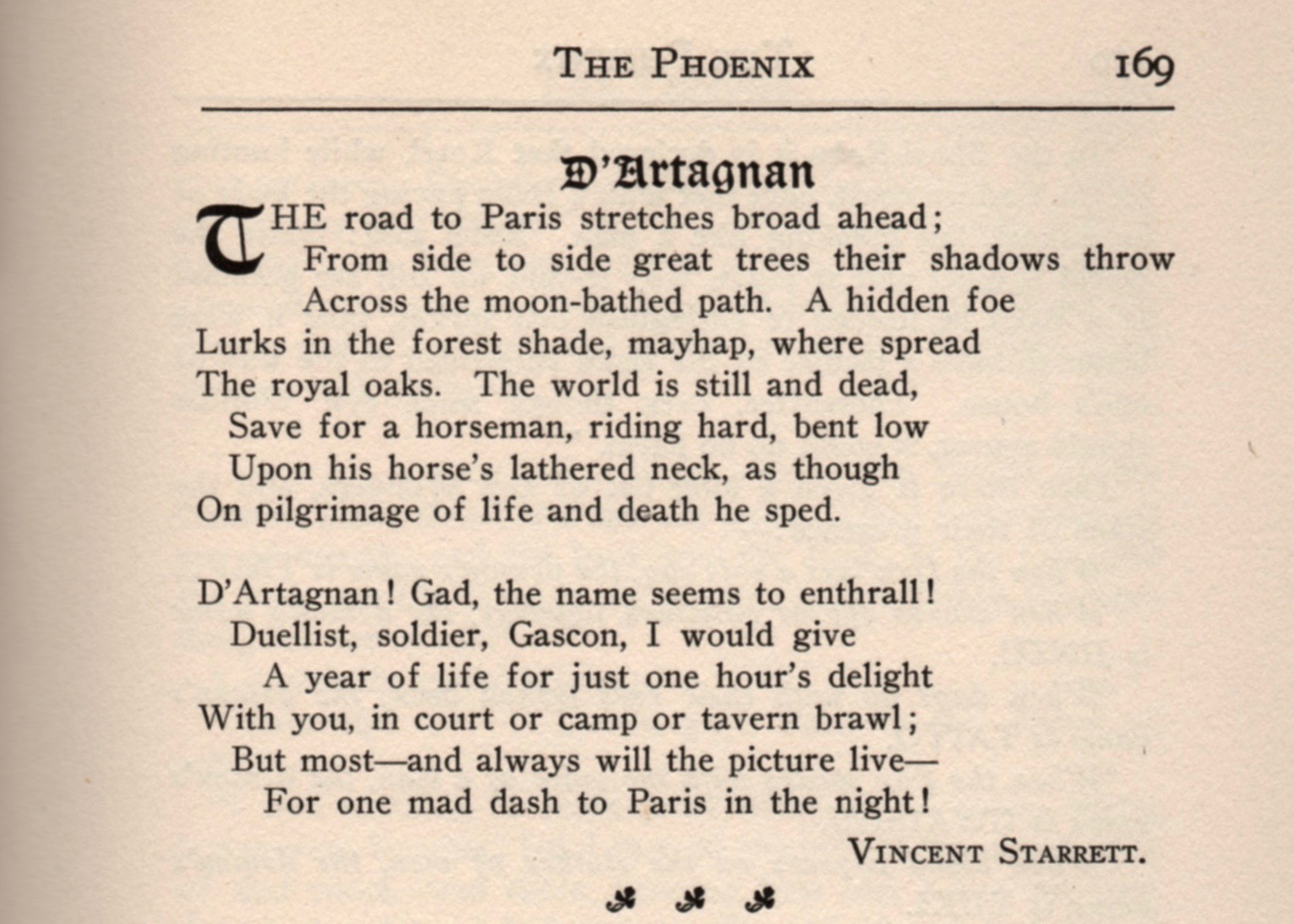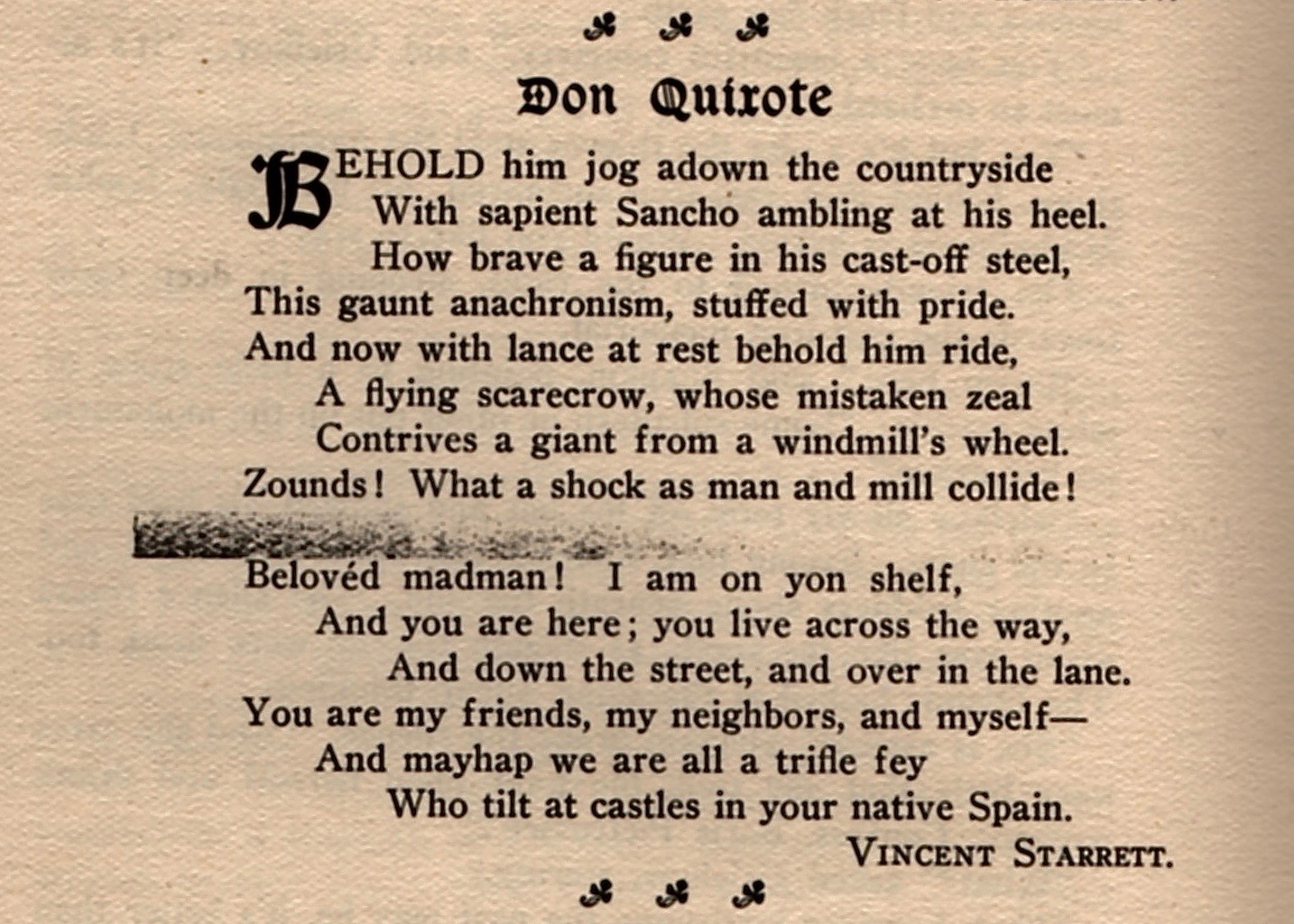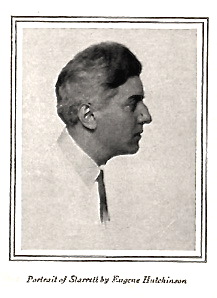Introduction and prologue: 'Where it is always 1895.'
Chapter 1: On the road to '221B'
A photo of Vincent Starrett from the collection of the late Don Yates.
By Way of Explanation
These chapters have their roots in a presentation delivered on August 6, 2010 at The Spirits of Sherlock Holmes conference held at the University of Minnesota. In the intervening years, I had hoped to find sufficient interest in publishing them as a little booklet.
And then I put the notes away.
Over the summer, I found the notes and realized I had new material to add. I expanded and updated the original talk into a series of blog posts and decided to drop them all at once, Netflix-style. You can sample them at your leisure or binge them all at once.
There is one big advantage of using the blog format. At a few points I’ll be able to add audio or link to other resources, either from this blog or outside sources.
In any case, I hope you’ll enjoy exploring the history and impact of “221B,” the most familiar of all non-Canonical writings.
In the beginning
This research is rooted in the 2000s when I briefly edited the Scion Societies column for The Baker Street Journal. After reading scion reports for several months, a pattern began to emerge. Most scions had the features that echo in some fashion the elements of the Baker Street Irregulars annual dinner: toasts to the Sherlockian dramatis personae, a learned paper or two, the elevation of new members, etc.
Starrett wrote out his poem for the late Don Yates in 1959. Don later sent me this scan of the MS.
At some point near the end of the evening, many societies will pause to hear a member read Vincent Starrett’s sonnet, “221B.” Why, I wondered, was this poem so popular? And what does it say about us, as devotees, that we have turned “221B” into a kind of Sherlockian profession of faith?
What I discovered in researching the topic is that Starrett’s sonnet has played a singular role in the history of the Sherlock Holmes movement. Rooted in the Great Depression and born of the destruction of the Second World War, “221B” is unique.
Without a vote, a coordinated campaign or conscious decision, “221B” has become a unifying element among Sherlockians across time and distance. Today, “221B” is as familiar to Holmes devotees as any quote from the master detective himself. It’s final line: “Where it is always 1895,” could be the marketing tagline for the Sherlock Holmes movement (if it ever needed one, which it does not).
What follows is a detailed attempt to trace the poem’s history and impact.
Prologue: ‘London is burning, London is burning’
London fires caused by Nazi bombing raids in 1940. By New York Times Paris Bureau Collection. - This media is available in the holdings of the National Archives and Records Administration, cataloged under the National Archives Identifier (NAID) 541917., Public Domain, https://commons.wikimedia.org/w/index.php?curid=3243510
On Sept. 8, 1940, while crouched behind haystacks at an RAF aerodrome just outside of London, CBS radio correspondent Edward R. Murrow and two other Americans watched as the German Luftwaffe rained fire down on the old city. Speaking later in his calm, low voice to the listeners back home, Murrow described the scene.
“The fires up the river had turned the moon red. The smoke had drifted down until it formed a canopy under the Thames. The guns were working all around us, the bursts looking like fireflies on a summer Southern night. Vincent Sheehan lay on one side of me and cursed in five languages. Ben Robertson lay on the other side and kept saying over and over again in that slow South Carolina drawl, ‘London is burning. London is burning.’ ”
Note: To hear a longer version of Murrow’s actual broadcast, introduced by Dan Rather, follow this link. It’s just 1 minute, 20 seconds long, but powerful.
A world away, in his adopted city of Chicago, a former newsman sat listening to the unsettling descriptions. Vincent Starrett had visited London not long before war broke out in Europe. The daily raids set fire to a city that had seemed both ancient and permanent.
Turning from the radio to his desk, Starrett saw the letters and books scattered there. Many were related in some way with Sherlock Holmes, London’s most famous fictional detective.
Amid concerns for the city’s residents and landmarks, Starrett must have wondered, “If London falls, what will become of 221B?”
A shelf of Vincent Starrett poetry, from the author’s collection.
Starrett the poet
Back in the day, when used and rare bookstores were far less rare, it was always a pleasure to visit a new city, find an unknown old bookshop and wander its sections on the hunt for books by Vincent Starrett. Of course there were the major works of Sherlockian interest: The Private Life of Sherlock Holmes in all its various editions; 221B: Studies in Sherlock Holmes and the other Holmes works that featured chapters or introductions by Starrett.
Each section of the bookshop held potential treasures for the Starrettian and Sherlockian alike. But one area of Starrett’s vast number of publications is often overlooked: his poetry.
Depending on your definition, there were a good half-dozen “major” volumes of Starrett’s poetry published during his lifetime, and enough small booklets, leaflets and one-offs that a collector can only be certain that he has not found everything, no matter how many copies sit on his shelf.
‘A pleasant minor talent’
Poetry was an early part of Starrett’s creative effort. As a student at Chicago’s John Marshall High School, Starrett already had acquired the bookwormish characteristics that would be a vital part of his adult life. As he described in his memoirs, Born in a Bookshop (p. 45), Starrett’s first published verse was dedicated to the memory of a certain gracious lady. The death of Queen Victoria was “a fatality that had struck deep into our home life,” recalled Starrett, whose tribute to Queen Victoria was published in the school’s paper, The Quill.
The Queen has passed to the unknown;
No other had such fame.
King Edward reigns on England’s throne,
The seventh of his name.Mourned as a woman and a queen,
The fairest of her race,
Down through the ages rings the paean
Of her immortal grace.
Recalling its publication many years later, Starrett wrote that he “received many compliments on this masterpiece and some criticism, too, but as the criticism came from boys in the class who could not have composed a poem on the death of Buffalo Bill, I knew they were just envious.” The poem’s success encouraged him to write more verse, which he did, on and off, for the next 70 years.
Starrett’s most prolific creative period was from the 1910s through 1930s, when he hoped to become one of Chicago’s – and America’s – best-known writers. He produced dozens of poems, often putting into verse the same passions that would show up in his other writings, with an emphasis on his beloved fictional characters.
The Phoenix, where some of Starrett’s earliest poetry was published.
He certainly had enough opportunities to find an audience.
Poetry was far more a part of the daily lives of the average American in early decades of the 20th century than it is today. Most newspapers carried a poem or two every day, and all the major general interest magazines featured verse tucked in between their longer prose pieces.
Starrett also lived in the age of the little magazine, where struggling poets could find a home to hone their writing skills and jockey to be recognized by major editors.
There are probably earlier examples of his adult poetry lurking out there in newspapers, but one of the first pieces that I’ve been able to document has the literary bent that you would expect from a romantic autodidact.
In November 1916 (when he was 30) Starrett had at least two poems published in The Phoenix magazine. Both are tributes to heroic figures from literature: “D’Artagnan” recalled the hot-headed youth who first appears in Alexandre Dumas’ adventure novel, The Three Musketeers. It illustrates Starrett’s child-like desire to jump into a fictional work and share a hero’s adventure. The next month, a similar tribute was published to Don Quixote.
‘And when you have read the poems you like the man’


Both of the poems were later included among Starrett’s 13 contributions to the second edition of Estrays, a slim 1920 booklet promoting the work of four young bucks hoping to be recognized as the next New Wave. As was often the case with Starrett’s work, his hopes fell short of reality.
Starrett was especially desperate to have his work published in Poetry magazine, and it was only the solace that came with decades of remove that later allowed him to recall in his memoirs that “my poems of the period should not have been published in Poetry. Many of them should not have been published anywhere.”
The contemporary critics were equally cool. It must have galled him to open an issue of Poetry from August, 1923, and read the anonymous review of his poetry collection entitled Ebony Flame.
Vincent Starrett has a pleasant minor talent that sings its way along the well-oiled grooves which other men have fashioned. His poems are echoes, but they are often gracefully turned and sometimes haunting. … And when you have read the poems you like the man, which is more than can be said of many a more authentic poet.
But if poetry was not going to make him a national reputation, Starrett vowed he would try other avenues: fantasy, mystery novels, short stories, and tales of the outré. While each attempt would bring some favorable notice, nothing promised the longevity or national renown he saw being offered to his fellow Chicago writers Ring Lardner, Ben Hecht and Carl Sandburg.
Starrett made a living for himself writing essays about books, writers and collectors, but there was only one subject that would offer him international recognition and lifelong accolades: Sherlock Holmes, as you will learn in Chapter 2.
‘221B’ Chapter Index
Chapter 1: Introduction and Prologue: ‘Where it is always 1895’
Chapter 2: 'So they still live for all that love them well'
Chapter 3: ‘Some of the most dramatic months… of contemporary history’
Chapter 4: ‘Here dwell together still’
Chapter 5: ‘He has done many little things for me’
Chapter 6: ‘A wider circulation’
Chapter 7: ‘Part of a slim volume’
Chapter 8: ‘This poem by my good friend’
Chapter 9: ‘Something remains of London in 1895’
Chapter 10: What is it we love about ‘221B’?
Chapter 11: Afterthoughts and Acknowledgments
Want to chat about this blogpost? Join us at the Studies in Starrett Facebook page:

